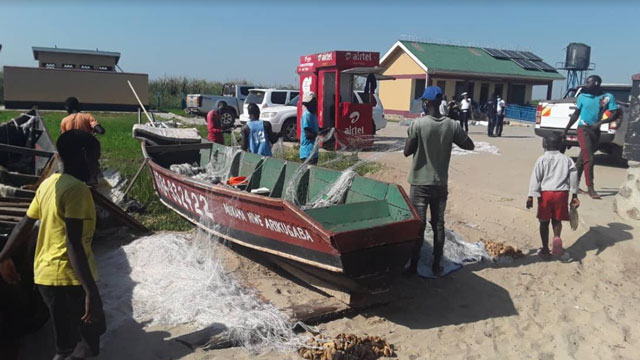Protect fishermen’s livelihoods from oil activities
Secondly, the fishermen operating on Lake Albert also noted that they are experiencing a number of challenges, including poor waste management, light pollution among others.

Op-Ed: On February 15, 2024, I got the opportunity to participate in an online exchange of learning for fishermen from Nigeria, South Africa, Tanzania, and Uganda.
The purpose of the exchange learning was primarily to enhance Ugandan and Tanzanian fishermen’s capacity to defend their livelihoods amidst Lake Albert oil project activities.
Lake Albert development includes Tilenga and Kingfisher upstream oil projects in Buliisa and Kikuube, respectively, as well as the construction of the East African Crude Oil Pipeline (EACOP) in Uganda and Tanzania. The Tilenga project is operated by TotalEnergies, and the Kingfisher is operated by China National Offshore Oil Company (CNOOC).
Unfortunately, in Uganda, the oil developers TotalEnergies and China National Offshore Oil Corporation (CNOOC) are undertaking oil and gas activities in critical and sensitive biodiversity areas, exposing the oil host communities, especially fisherfolk, to untold suffering.
During the exchange learning, the fishermen living on the shores of Lake Albert stated that after oil was discovered in the Albertine Graben, the oil companies TotalEnergies and China National Offshore Oil Company (CNOOC) acquired their land to pave the way for oil projects that are Kingfisher, EACOP, and Tilenga without being compensated.
The act contradicts Article 26 of Uganda’s Constitution of 1995, which stipulates that no person shall be compulsorily deprived of property or any interest in or right over property of any description except prompt payment of fair and adequate compensation prior to the taking of possession or acquisition of the property.
Secondly, the fishermen operating on Lake Albert also noted that they are experiencing a number of challenges, including poor waste management, light pollution, noise pollution, polluted water run-off, forced displacements, and reduced fish production, among other factors that were not the case in the early 1920s and 1980s.
The people of Buliisa, Hoima, and Kikuube by then lived sustainable livelihoods and termed Lake Albert as the lifeline, as food security was guaranteed to fishermen as long as they had licenses authorizing them to access the lake.
I urge the ministry of Agriculture, Animal Health, and Fisheries and other line ministries to intervene and protect the fisher-folk’s livelihoods from oil activities. If not, TotalEnergies and CNOOC should first halt the Tilenga and Kingfisher oil activities and have the fisher-folks’ challenges addressed because their livelihoods heavily depend on fishing.
The author is Hildah Nsimiire, a concerned citizen.
Disclaimer: As UG Reports Media LTD, we welcome any opinion from anyone if it’s constructive for the development of Uganda. All the expressions and opinions in this write-up are not those of UG Reports Media Ltd. but of the author of the article.
Would you like to share your opinion with us? Please send it to this email: theugreports@gmail.com.






